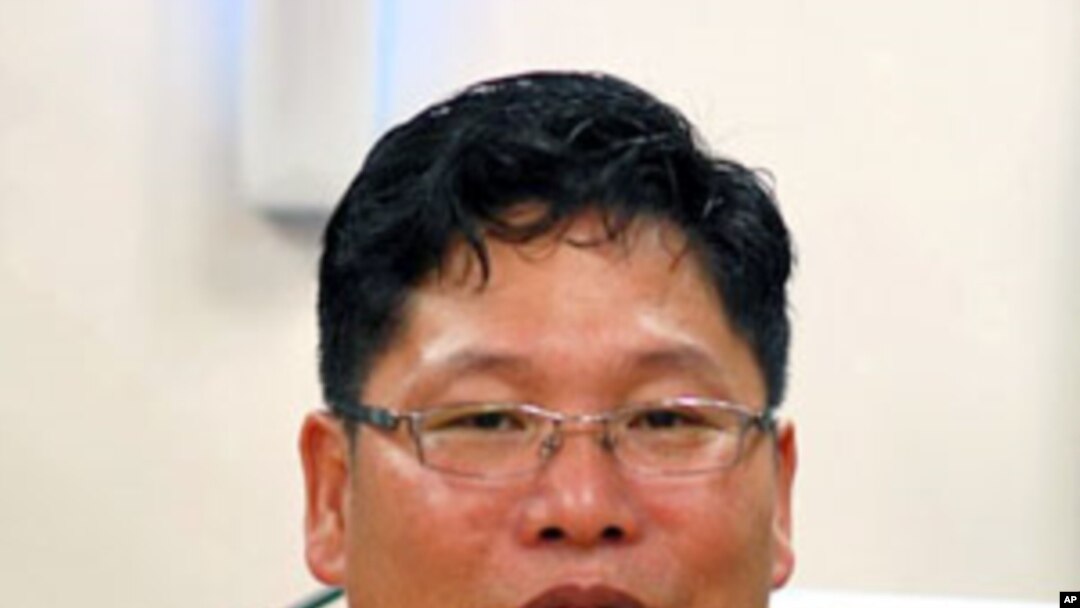A little-known South Korean Christian group is doing its best to expand what outsiders know about neighboring North Korea. The Caleb Mission has gained some recognition in recent months for releasing clandestine video of life inside the reclusive North. And now it has provided VOA with what it says is a secret North Korean military manual that regional security analysts consider authentic.
One of South Korea's smallest and most obscure religious communities is making a name for itself by providing rare glimpses of life inside North Korea, and revealing some of its secrets.
Reverend Kim Sung-eun runs the Caleb Mission in Cheonan, about 80 kilometers south of the capital, Seoul. His wife, he says, is a former lieutenant in North Korea's army. She is one of 30 or so defectors from the North who are frequently seen at the mission.
Kim says he is in regular contact with collaborators inside North Korea. Some secretly videotape what is going on in the country, which is virtually sealed off from the outside world. Others, he says, smuggle out official documents.
The pastor gave VOA a partial copy of what appears to be a 2005 North Korean military manual that details electronic warfare countermeasures, such as using radar-absorbing paint to camouflage jets and ships.
He did not go into detail about how the Caleb Mission acquired the manual, but U.S. and South Korean officials who have seen it consider the document authentic.
A South Korean newspaper also has obtained part of the manual and has reported on its contents
Kim says they decided to release the manual because their colleagues inside North Korea are taking great risks by working on their projects. Thus, he explains, he wants to see some recognition for their efforts.
Daniel Pinkston, a long-time North Korea scholar and an analyst in Seoul for the International Crisis Group, considers the document important. "It's certainly useful for analysts on the outside. And I would agree anyone in North Korea, any KPA (Korean People's Army) soldiers or officers who would smuggle such a document out of the country, if they were to be caught, would suffer serious consequences. It would be a great risk to them, of course," he said.
In communist North Korea, those suspected of disloyalty face imprisonment. Convictions for treason or espionage - and many lesser offenses - usually mean a death sentence.
At Caleb Mission, Kim says he has or can gain access to other sensitive materials, including videos and documents, but he needs to provide compensation to those who risk their lives to provide it.
He hopes that by releasing the information more widely in South Korea, he can generate funds to pay his collaborators in the impoverished North.
Kim says he has information detailing North Korean-sanctioned manufacturing and exporting of illicit drugs and the country's extensive network of internment and re-education camps for political prisoners.
The U.S. State Department has warned in the past that North Korea was involved in drug trafficking.
Analyst Pinkston says the apparent willingness of North Koreans to provide such documentation - whatever the motives - could be a significant signal of societal change. "If we see more of these things coming out - materials, information, people - especially from the military, then that could be a sign of some breakdown in discipline and control. I'm not saying that's the case here," he states, "but when we do see these things coming out, that's something we have to think about."
North Korean media unfailingly praise Kim Jong Il and his father, the country's first leader, creating a personality cult that dominates the government. The state controls almost all aspects of life, including food supplies, access to the media and employment.
Human rights groups consider North Korea to be one of the most repressive nations in the world. The government also has struggled for nearly 20 years to feed its people. After the collapse of communist governments in Europe, which had supported the North financially, its economy has nearly collapsed and it relies heavily on international food aid to avoid mass starvation.
Change, however, could be coming to North Korea. A rare meeting of the ruling Workers Party is expected to start soon to fill leadership slots. Many North Korea experts believe supreme leader Kim Jong Il will name his third son, Kim Jong Un, to a prominent post as part of grooming him to be his successor. The son is believed to be about 27 years old and has yet held no official position.
There are reports, however, of growing dissatisfaction among North Koreans about passing power to a young, little-known member of the Kim family.
The country faces renewed food shortages and continuing economic instability. In addition, its people are increasingly aware - through clandestine exposure to outside news media - of the huge gap between their country and most of the rest of the world, especially neighboring South Korea.


